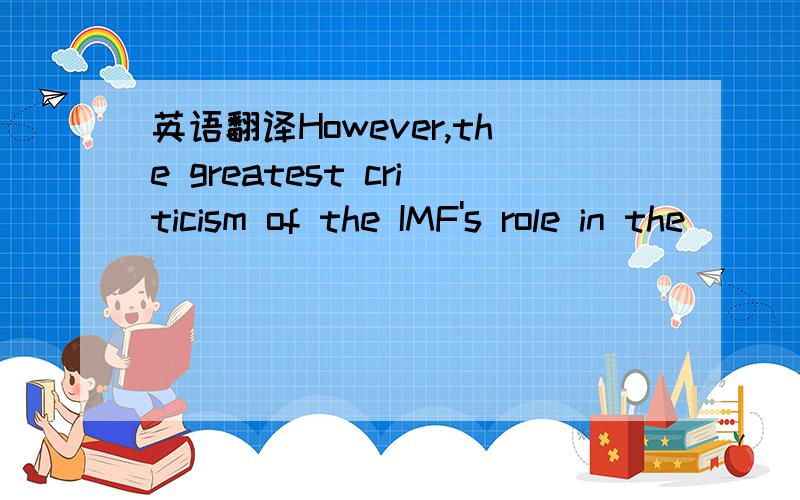英语翻译However,the greatest criticism of the IMF's role in the
来源:学生作业帮 编辑:神马作文网作业帮 分类:英语作业 时间:2024/11/17 18:08:50
英语翻译
However,the greatest criticism of the IMF's role in the crisis was targeted towards its response.As country after country fell into crisis,many local businesses and governments that had taken out loans in US dollars,which suddenly became much more expensive relative to the local currency which formed their earned income,found themselves unable to pay their creditors.The dynamics in this scenario were similar to that of the Latin American debt crisis.
In response,the IMF offered to step in the case of each nation and offer it a multi-billion dollar "rescue package" to enable these nations to avoid default.However,the IMF's support was conditional on a series of drastic economic reforms influenced by neoliberal economic principles called a structural adjustment package (SAP).The SAP's called on crisis nations to cut government spending to reduce deficits,allow insolvent banks and financial institutions to fail,and aggressively raise interest rates.The reasoning was that these steps would restore confidence in the nations' fiscal solvency,penalize insolvent companies,and protect currency values.However,the effects of the SAP's were mixed and their impact controversial.Critics,however,noted the contractionary nature of these policies,arguing that in a recession,the traditional Keynesian response is to increase government spending,prop up major companies,and lower interest rates.The reasoning was that by stimulating the economy and staving off recession,governments could restore confidence while preventing economic pain.They pointed out that the U.S.government pursued expansionary policies,such as lowering interest rates,increasing government spending,and cutting taxes,when the U.S.itself entered a recession in 2001.
Thailand
Exchange rate:Baht per U.S.DollarFrom 1985 to 1995,Thailand's economy grew at an average of 9%.On 14 May and 15 May 1997,the baht,the local currency,was hit by massive speculative attacks.On 30 June,Prime Minister Chavalit Yongchaiyudh said that he would not devalue the baht,but Thailand's administration eventually floated the local currency,on 2 July.Opposition parties had claimed that future Thai Prime Minister Thaksin Shinawatra profited from the devaluation[4][5],although subsequent Opposition party-led governments did not investigate the issue.
However,the greatest criticism of the IMF's role in the crisis was targeted towards its response.As country after country fell into crisis,many local businesses and governments that had taken out loans in US dollars,which suddenly became much more expensive relative to the local currency which formed their earned income,found themselves unable to pay their creditors.The dynamics in this scenario were similar to that of the Latin American debt crisis.
In response,the IMF offered to step in the case of each nation and offer it a multi-billion dollar "rescue package" to enable these nations to avoid default.However,the IMF's support was conditional on a series of drastic economic reforms influenced by neoliberal economic principles called a structural adjustment package (SAP).The SAP's called on crisis nations to cut government spending to reduce deficits,allow insolvent banks and financial institutions to fail,and aggressively raise interest rates.The reasoning was that these steps would restore confidence in the nations' fiscal solvency,penalize insolvent companies,and protect currency values.However,the effects of the SAP's were mixed and their impact controversial.Critics,however,noted the contractionary nature of these policies,arguing that in a recession,the traditional Keynesian response is to increase government spending,prop up major companies,and lower interest rates.The reasoning was that by stimulating the economy and staving off recession,governments could restore confidence while preventing economic pain.They pointed out that the U.S.government pursued expansionary policies,such as lowering interest rates,increasing government spending,and cutting taxes,when the U.S.itself entered a recession in 2001.
Thailand
Exchange rate:Baht per U.S.DollarFrom 1985 to 1995,Thailand's economy grew at an average of 9%.On 14 May and 15 May 1997,the baht,the local currency,was hit by massive speculative attacks.On 30 June,Prime Minister Chavalit Yongchaiyudh said that he would not devalue the baht,but Thailand's administration eventually floated the local currency,on 2 July.Opposition parties had claimed that future Thai Prime Minister Thaksin Shinawatra profited from the devaluation[4][5],although subsequent Opposition party-led governments did not investigate the issue.

然而,最大的批评国际货币基金组织的危机中的作用是针对它的回应. 作为国家在国家陷入危机 不少当地企业和政府已经采取了贷款美元 突然变得昂贵得多,相对于当地货币,而f
回应 国际货币基金组织提供的步骤,在每一个民族,并提供了数十亿美元的"救市" 使这些国家避免违约. 不过, 国际货币基金组织的支持是有条件的一系列大刀阔斧的经济改革受新自由主义的经济原则叫做stru 惩罚破产公司,并维护币值. 但是,影响SAP的混合及其影响的争议. 评论家,然而,指出,紧缩性政策,他们认为,在经济不景气时, 传统的凯恩斯主义的反应是增加政府支出
泰国汇率:泰铢美国dollarfrom1985年至1995年,泰国的经济增长率平均为百分之九. 5月14日和1997年5月15日,泰铢贬值,当地货币遭投机者狙击. 6月30日,总理差瓦立说,他不会贬值的泰铢,二
回应 国际货币基金组织提供的步骤,在每一个民族,并提供了数十亿美元的"救市" 使这些国家避免违约. 不过, 国际货币基金组织的支持是有条件的一系列大刀阔斧的经济改革受新自由主义的经济原则叫做stru 惩罚破产公司,并维护币值. 但是,影响SAP的混合及其影响的争议. 评论家,然而,指出,紧缩性政策,他们认为,在经济不景气时, 传统的凯恩斯主义的反应是增加政府支出
泰国汇率:泰铢美国dollarfrom1985年至1995年,泰国的经济增长率平均为百分之九. 5月14日和1997年5月15日,泰铢贬值,当地货币遭投机者狙击. 6月30日,总理差瓦立说,他不会贬值的泰铢,二
英语翻译one of the legacies遗产 of the U.S.role in designing计划 the
what's the role of a family in the society?
英语翻译1,The role of L1 in second language learning2,The role o
英语翻译one of the world's greatest storytellers,hans christian
英语翻译A recurring criticism of the UK’s university sector is i
英语翻译The role internet plays in our way of learning
英语翻译The role of natural selection in evolution was formulate
英语翻译The role of egg yolk supplementation in semen reactivati
英语翻译in this way,conscientious and radical criticism of the g
英语翻译BioTrade:The Role of the Green Economy in the Context of
英语翻译However,the vast majority of organizations in Japan have
the world s greatest